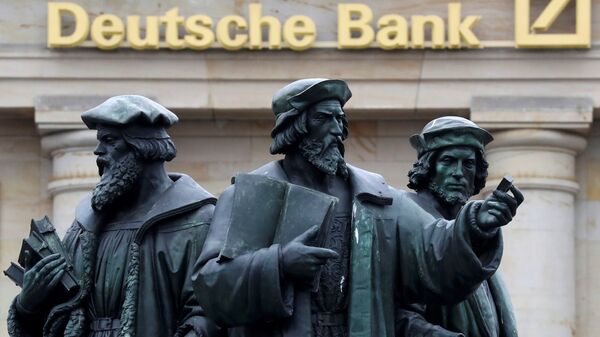Deutsche Bank, the largest banking services group in Germany with well over a trillion dollars worth of assets, made a €3.1 billion net loss in the second quarter of this year, its biggest quarterly loss in four years and the second largest since the final months of 2008 when the financial crisis erupted.
A major driver of the historically poor performance is the €3.4 billion the bank has spent so far in a major restructuring of its operations, which has seen overseas offices and entire divisions scrapped, and almost 1,000 staff sacked.
Deutsche Banks forecasts the restructuring to last until 2022, cost at least €7.4 billion in total, and necessitate the firing of 18,000 employees - although the bank hopes to return to profit in 2020.
#DeutscheBank collapsing the same time the prophetic boom, Brexit, trade deal, grave surrender and currency reset are manifesting. This is going to be very ugly indeed. Going to be vital we pay close attention & follow directions of the Father so we exchange & are not deceive.
— Currency365 (@Currency365) July 24, 2019
Many of the staff to be laid off were employed in Deutsche Bank’s equity trading division, and its City of London office. While presently one of the City’s biggest employers, with 7,000 staff posted in the ‘square mile’, the fate of the bank’s operations in the UK is highly uncertain given the country’s impending departure from the European Union, and the lender’s shift away from riskier markets.
“We’ve already taken significant steps to implement our strategy to transform Deutsche Bank. These are reflected in our results. A substantial part of our restructuring costs is already digested in the second quarter. Excluding transformation charges the bank would be profitable and in our more stable businesses revenues were flat or growing. This, combined with our solid capital and liquidity position, gives us a firm foundation for growth,” Deutsche Bank chief executive Christian Sewing said in a statement.
Decline and Fall
Deutsche Bank has been a major source of concern for international investors, economists and policymakers for some time - in 2016 the International Monetary Fund called the bank “the most important net contributor to systemic risks” to the global financial system, and many feared it could be the next Lehman Brothers, the collapse of which would precipitate a global financial crisis.
Why are you the go-to bank for money-launderers, drug/human traffickers, and other assorted mutants? Is this the market niche you sought out? Was there a meeting where ‘let’s finance evil’ the consensus business model moving forward?
— Adamant_Actual (@Adamant_Actual) July 23, 2019
The bank’s sorry state is the result of a number of factors, including its prominent role in several major financial scandals. Legal expenses, fines and reputational damage has resulted in its shares losing 70 percent of their value since 2007 - for instance, in April 2015 it was forced to pay a combined US$2.5 billion in fines to US and UK authorities for its involvement in the Libor rate-fixing scandal, and in January 2017, Deutsche reached a US$7.2 billion settlement with the U.S. Justice Department over its sale and pooling of toxic mortgage securities. In total, Deutsche Bank has paid more than US$13 billion for litigation since 2012 - it may have to pay out more in future too, as its headquarters was raided by German tax authority representatives in November 2018.


